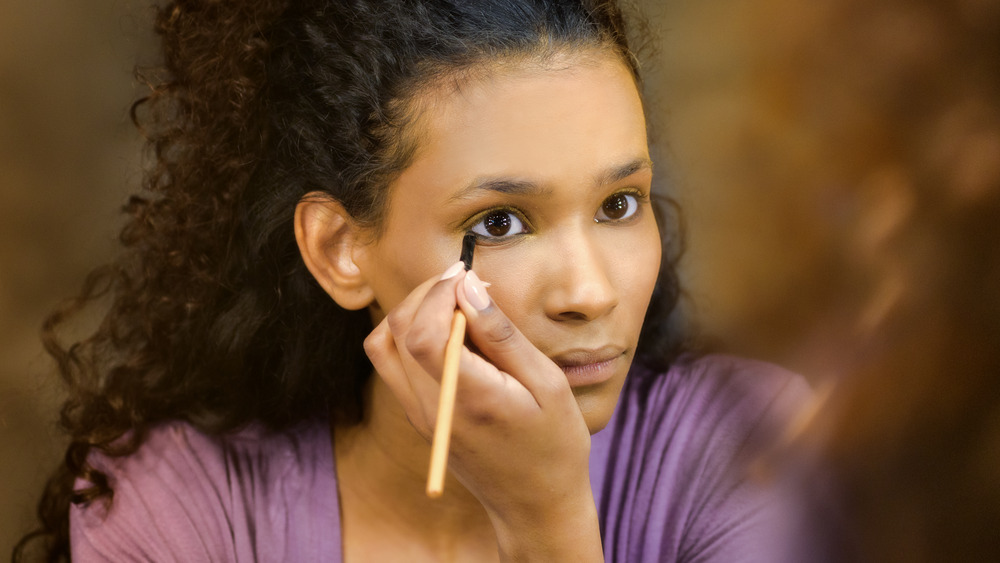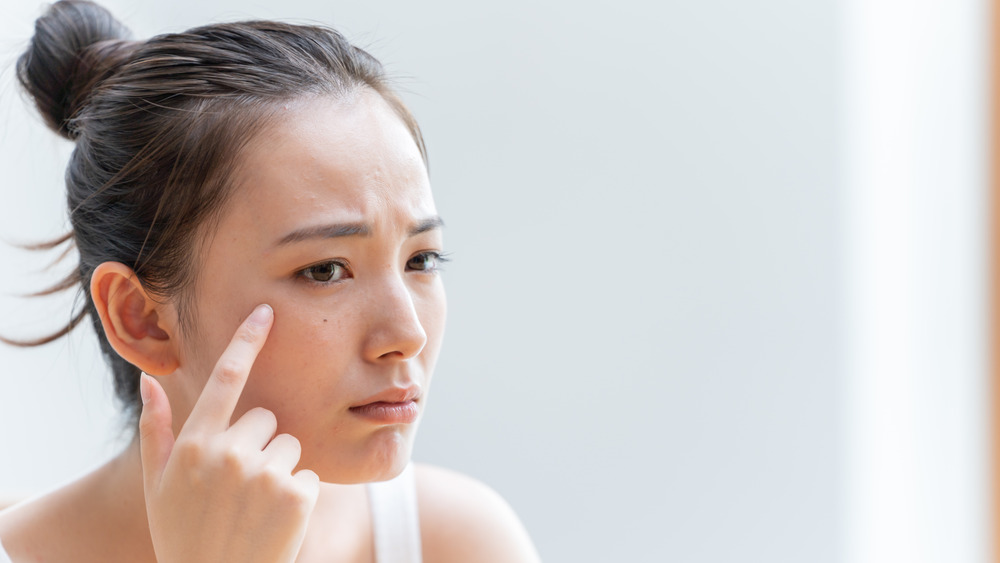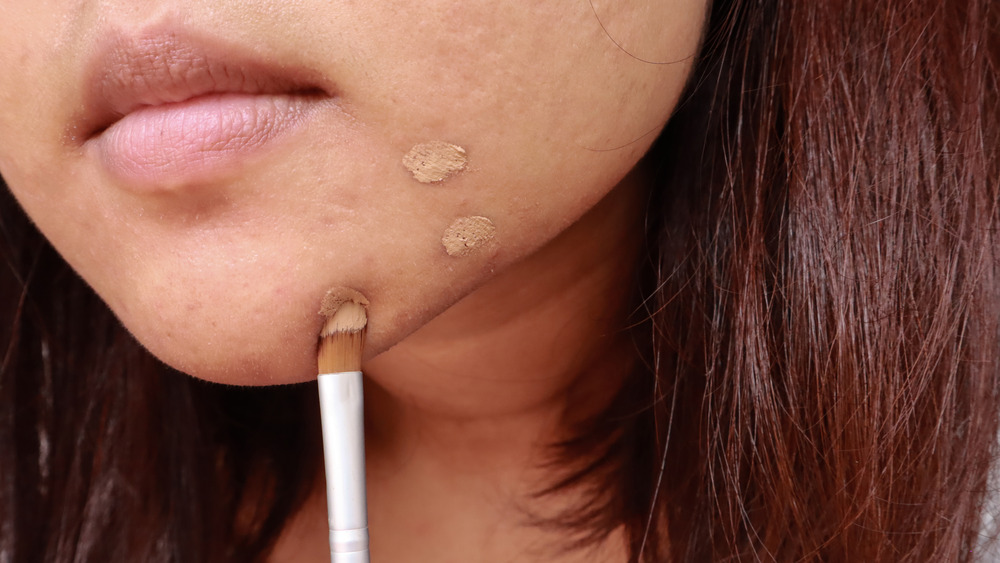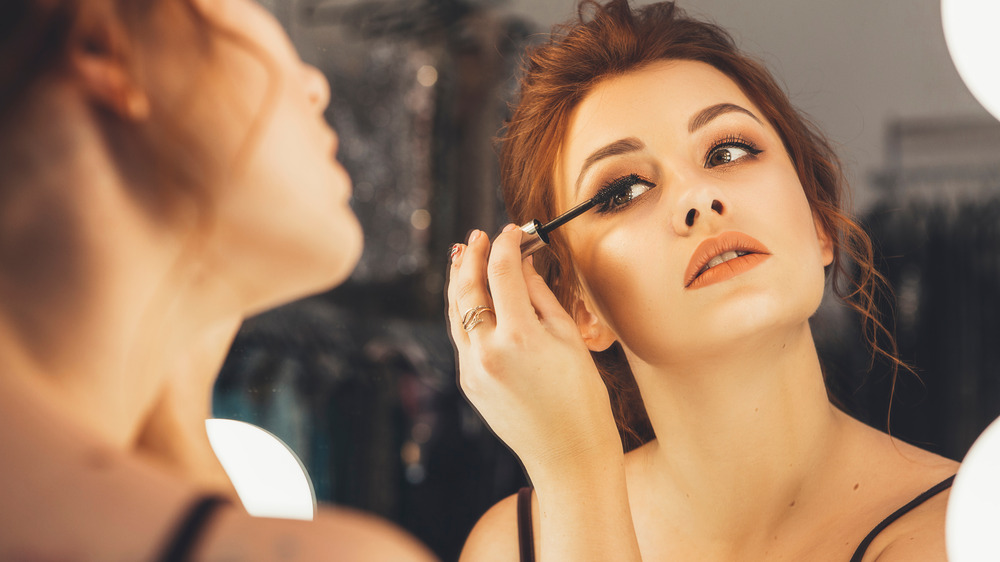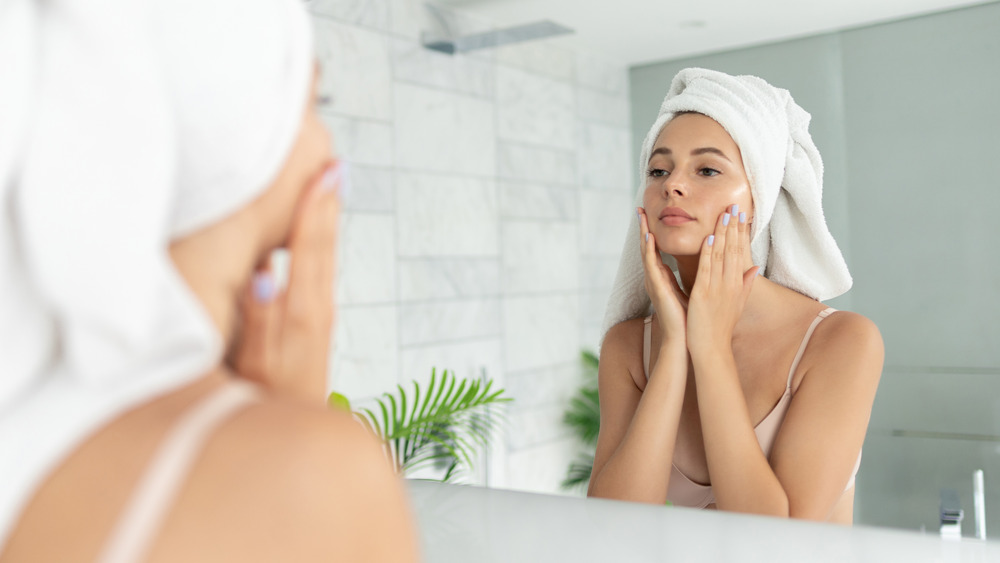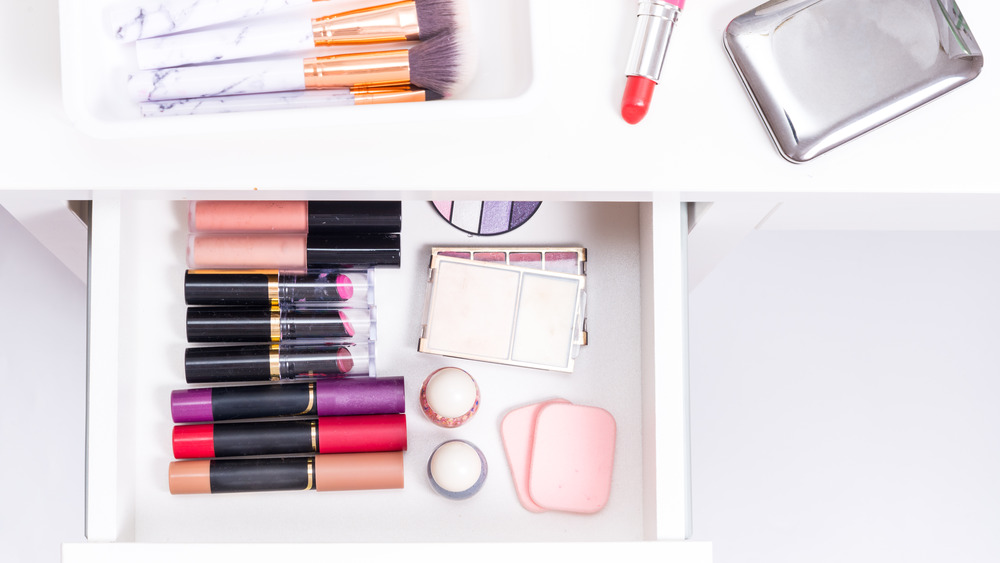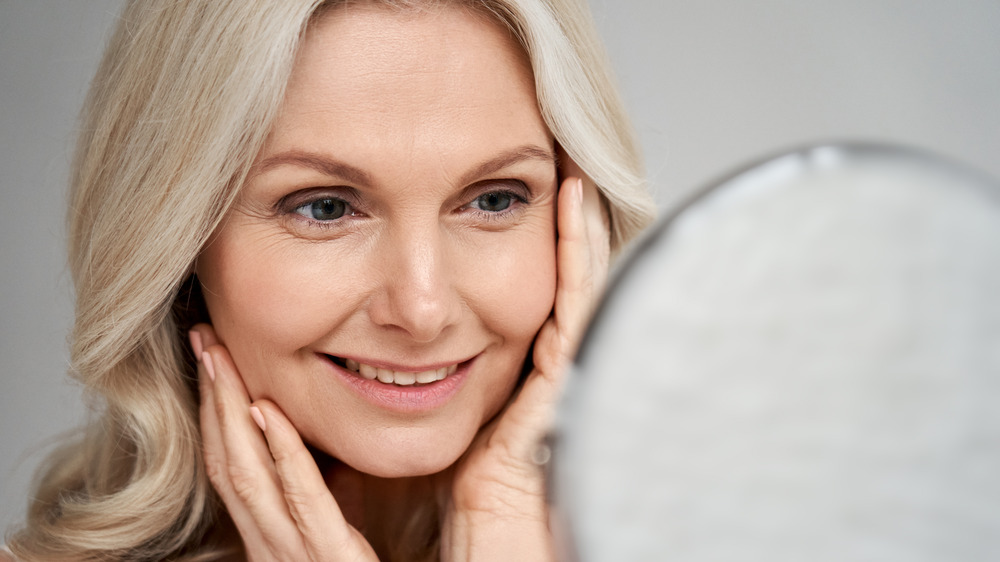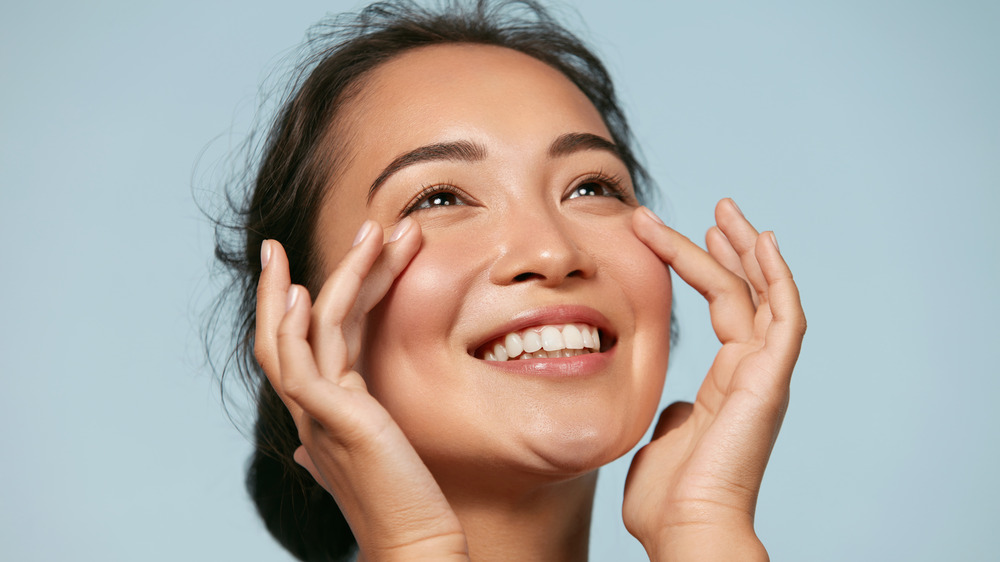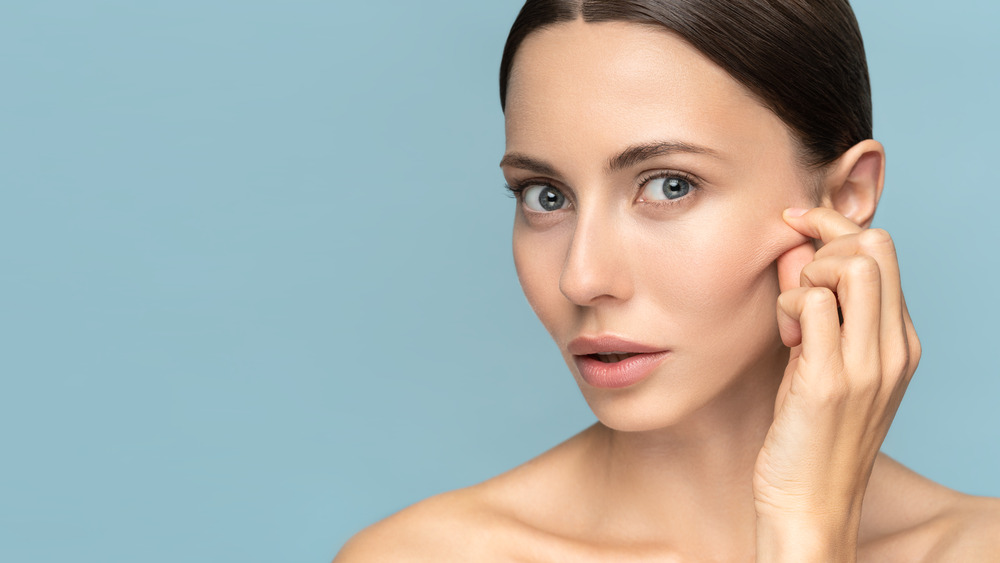What Happens To Your Face When You Wear Makeup Every Day
You love wearing makeup. It makes you look good, feel fresh, and empowers you to be ready to face the world. As supermodel Tyra Banks put it, "I love the confidence that makeup gives me." Of course, applying tints and concealer and all sorts of colorful eye gunk day after day can take a toll on your complexion. The not so pretty truth is that daily prettifying can lead to quite a few skin troubles — and not just the occasional acne breakout.
Of course, if you are diligent about removing every last near-professionally blended smear and smudge, you can help to decrease the likelihood of these complexion killers. Nevertheless, your face could benefit from the occasional day off from your rigorous makeup routine.
Want to know what happens to your face when you rock makeup every single day? Before you pause to slather your face with foundation, read this.
You may break out more when you wear makeup every day
Even if you are generally blessed with an acne-free face (lucky you!), you may start to break out when you begin wearing makeup on the daily. As explained by the American Academy of Dermatology Association, you may experience what's called acne cosmetica, or tiny whitehead-like bumps and ridges on your cheeks, chin, or forehead. The part that makes this type of acne super confounding and difficult to identify is that it can take mere days to appear or up to six months to pop out.
So what should you do to avoid this confusing complexion buster? As per the AAD, read your makeup labels. You will want to see at least one of the following descriptors: "oil-free, won't clog pores, or non-comedogenic." Moreover, apply your daily makeup with restraint, cleanse your face thoroughly, and wash your makeup applicators and brushes regularly. And if you suspect that you could be dealing with acne cosmetica? Give your face a break; it will typically clear up shortly after you stop using the offending products.
You may prolong the life of a pesky pimple by covering it with makeup
It is a vicious cycle. You have clogged pores, you get a painful pimple, and you, naturally, cover it up with makeup. Of course, by hiding your blemish you could be prolonging its lifespan and doing more harm than good. Indeed, Yale School of Medicine dermatologist Mona Gohara told Self that burying a zit in concealer can "stoke the fire."
Dermatologist Dr. Shereene Idriss agreed, telling the magazine that the best thing you can do is bare your pimple. Ultimately, airing that puppy out will expedite healing and get it gone sooner. "If you're brave enough to go makeup free for the short term in order to gain better skin in the long term, then I would encourage it," she said.
What's more, dermatologist Dr. Kenneth Howe explained why you should definitely leave an "open" pimple alone. If the fragile skin barrier is already compromised, applying makeup will get deeper into the tissue which can exacerbate the issue and lead to further inflammation. Basically, lay off the foundation. But if you absolutely must cover up a zit, stick with an oil-free tinted moisturizer, as recommended by Dr. Lily Talakoub (via Self).
Layering on the mascara could be hurting your eyes
Can't imagine a day without your lash-lengthening, volumizing mascara? We all love having eyelashes with oomph, but you might consider giving your mascara the occasional day off. Moreover, you will want to be diligent about removing your eye makeup every night and ditching your beloved tube once it has expired.
Ceri Smith-Jaynes, optometrist and spokeswoman for the Association of Optometrists, told The Sun that wearing mascara daily can lead to "serious infection" if you are not careful. She elaborated, saying, "Generally, any cosmetic applied around the eye area can migrate in to the eye in a matter of minutes." Worse yet, if the eye's protective "tear film is disrupted, the tears evaporate more quickly and the eye becomes dry, again leading to irritation," she said.
If you're waking up with raccoon eyes, you may not be adequately removing your mascara each night, and this, too, can be problematic. Dermatologist Alexis Granite told The Sun that "any product that isn't taken off has the potential to not only clog your pores, but also cause irritation, inflammation and infections. Inflammation around the eyelids can also lead to lash loss."
You may not be getting adequate protection from the sun
Your tinted moisturizer or foundation or face powder may boast SPF 20. So if you slather your makeup on, you can assume you are good to go, right? Not so fast. Dermatologists agree that the sun protection factor offered in most makeup products is not enough to adequately shield your skin from harmful rays. This is true for a number of reasons.
First, as explained by Massachusetts dermatologist Papri Sarkar in Insider, people typically need a nickel-size amount of sunscreen to adequately cover and protect their faces. Most people, however, use about half that amount when just using makeup (they don't want their coverage to look caked on, after all). For this reason, California dermatologist Caren Campbell suggests starting with a layer of broad-spectrum sunscreen with an SPF of 30 under makeup. "The term broad-spectrum means it protects against UVA and UVB rays," she explained.
Both doctors also acknowledge that women wearing makeup are less likely to reapply sunscreen throughout the day. To this end, they suggest trying a powdered sunscreen to dust on as needed.
Your makeup could be causing contact dermatitis
Suddenly itchy and red in the face? It could be your daily makeup causing problems. Maybe it's a new product — or perhaps its a tried-and-true item in your regular rotation. Either way, dermatitis can develop at any time. Dermatology Professor Kathryn Schwarzenberger told Self that "it is possible to use a product for years with no problem, only to [develop contact dermatitis] at a later date."
Of course, if you experiment with different products on a normal basis, and you have sensitive skin, you are more likely to elicit an angry response from your skin — and it will be harder to pinpoint which new addition is the culprit. Thus, you may perpetuate the problem on the daily. With this in mind, you should try to "patch test" a new makeup must-have before incorporating it into your routine. Yes, this requires time and patience, but it can save you — and your skin — a whole lot of trouble (via Self).
You could be exacerbating eczema
Got eczema? Makeup may complicate the issue. First off, it is difficult to find makeup that sits well on dry skin. What's more, it is important to choose makeup that won't aggravate sensitive patches. Registered nurse Karen Ragaini told InStyle that treating the underlying issue needs to be priority — or "you can end up causing more irritation to the skin."
Ragani also advises daily makeup wearers to do some due diligence when it comes to researching what is in a product. If you suffer from eczema, it is even more critical to know what you are putting on your face. "The user must be savvy on the other ingredients on the label that can be irritating and cancel out the calming effects of the 'good' ingredients." Those who have über sensitive skin and are prone to flare ups should also gingerly apply makeup with clean fingertips rather than brushes and applicators, as advised by Patricia Boland, vice president of Research & Development at Colorescience. "Makeup sponges and brushes tend to harbor more germs," Boland further told InStyle.
Wearing makeup every day could cause your face to look older
Love piling on all sorts of products day after day? We get it. But you could be making yourself appear older than your actual age. Yes, applying makeup with a heavy hand can aesthetically age you. Generally speaking, less is more. As recommended by Glamour, try to only powder the parts of your face that get oily; spare yourself a liberal dusting. You should also avoid a matte foundation, as a glow will add youth to your complexion. Finally, eye shadows with a hint of shimmer can "brighten eyes by distracting from imperfections like dark circle."
On the other hand, as advised in Real Simple, try to avoid bright and bold lid colors. These can settle into the crease and make you look older. Instead, opt for more natural hues and remember to pay attention to your eyebrows. Filling them in with a light powder and brush or a pencil will help to frame your face and, ultimately, make you look younger. (Yes, in this instance we are telling you that adding a product into your regimen will help!)
Wearing makeup every day could quite literally age your skin
If you wear makeup every day and neglect to properly remove it all before bed, you could be causing your skin to prematurely age. Dermatologist Kavita Mariwalla told Well + Good that the skin renews itself as you sleep. But if you have makeup covering your pores, it traps the dead skin and stops the necessary shedding process in its tracks. Furthermore, you could be fueling free radical damage. "By not allowing your skin to recover from oxidative stress that occurs during the day, you can wind up with prematurely aged skin," Dr. Mariwalla explained.
If you are commonly guilty of falling asleep with a face full of makeup, maybe lay low on the foundation for a bit. "One day [of sleeping in makeup] won't do anything too bad, but try to not wear heavy makeup day after day if that happens," Dr. Mariawall cautioned.
Another reason regular makeup wearing could contribute to wrinkles? You may be pulling and tugging at your face too aggressively when you apply that daily eyeliner and concealer. The same goes for removing makeup. Be gentle and your youthful complexion will thank you (via Good Housekeeping).
Wait, your makeup could prevent signs of aging?
Of course, if you are using makeup that doubles as skin care, you could be doing your complexion some good when you apply your daily foundation. As noted by Byrdie, some face makeup options work to even out your complexion and turn back the clock with active anti-aging ingredients like hyaluronic acid and retinol.
Still, before you reach for the first wrinkle-reducing concealer you see on the drugstore shelf, heed some advice from Dr. Patricia Farris, a clinical assistant professor of dermatology at Tulane University School of Medicine. She told Good Housekeeping that you should make sure that things like Vitamin C and retinol are listed toward the beginning of the ingredient list; further back, and you can assume they won't actually be able to do much.
Dermatologist Brandith Irwin advises people to read the label carefully. Words matter — and most products don't actually claim to reduce wrinkles. Instead, they boast their ability to "'minimize the appearance of wrinkles" or "visibly reduce fine lines" (via Good Housekeeping).
Makeup can disrupt the skin's natural renewal process
You want to encourage cell turnover on your face. As explained by dermatologist David Lortscher in Well + Good, this is the "continuous process of shedding dead skin cells and subsequently replacing them with younger cells." Rhea Souhleris Grous, aesthetics director at Union Square Laser Dermatology, noted that without "cellular turnover, you have a buildup, and it's like a traffic jam at the surface." Ultimately, this can cause hyperpigmentation and other skin issues.
If your face is constantly loaded with makeup, you could be inhibiting this important regenerative process (via Self). Basically, if you want to have smooth and clear skin with an even tone, you will want to give your complexion a breather every once in a while. StyleCaster recommends trying a weekend or even a week without makeup to see how your skin responds. At the very least, be sure to go without makeup while asleep at night (the hours of renewal).
Makeup impedes the egress of the sweat
Do you put a full face of makeup on to hit the gym? We know you want to look your best while you are lifting and spinning and squatting, but that dewy sweaty glow on top of your foundation is clogging your pores something fierce.
Dermatologist Neal Schultz explained to Observer that face-primping products are a flat-out no-no before working out. "Makeup impedes the egress of the sweat, causing blockages and breakouts. When you wipe off the sweat, you drive the makeup into the open pores." In fact, he elaborated, it is most critical to thoroughly wash your face before a sweat-heavy session. "When you perspire, you tend to wipe your skin, which means you rub in not only your makeup but also the grime, dirt and oils that were there," he said.
Not willing to not cover your face before you hop on the treadmill? Dermatologist Patricia Wexler told Observer that you may likely break out with "inflammatory papules and pustules." Weigh your options carefully!
Applying makeup every day could cause you to lose elasticity in your skin
You want to keep your skin young and plump, surely. But you could be losing collagen if you perpetually have makeup on your face and neglect to properly remove it after a long day of wear.
Dermatologist Sue Ann Wee told Byrdie, that "makeup can trap dirt and environmental pollutants inside the skin, and this type of environmental stress can result in increased free radicals which can cause DNA mutations, collagen degradation, and, over time, can result in premature aging." This is why it's especially important to remove your makeup before going to bed.
In case you are unaware, collagen is "the most common protein found in the body," as noted by Healthline. "When collagen levels are healthy, cells that contain collagen take on a strong and youthful appearance." So you definitely do not want to do anything that causes your complexion to lose this vital building block. Try to give your face a rest from makeup when you can — and definitely cleanse at night.
Makeup can work its magic beyond the face
Skin aside, wearing makeup can help you look and feel your best. A 2016 study published in Cogent Psychology, which was conducted collaboratively at Harvard Medical School and the University of Chieti in Italy, found that the "lipstick effect" is real. In other words, women who wear makeup have higher self-esteem. This probably comes as no big shock to ladies, though. A little under-eye concealer and a coat of mascara can work wonders to get us feeling ourselves.
What is interesting and surprising, though, is that the researchers found that makeup can also enhance cognitive function. Female students had to complete tests; some were asked to wear makeup, others were told to listen to upbeat music, and a last group was instructed to color a picture. Those wearing cosmetics generally performed better than those in the other two groups. The truth is: Self-love comes from within, but a new lipstick or some bright blush can give you the boost you need to feel motivated and successful.

